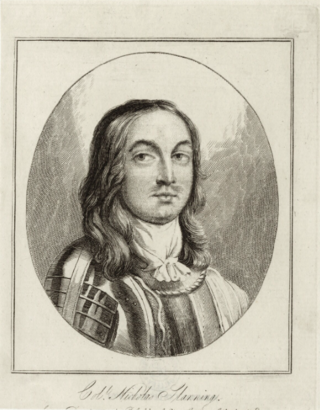Related Research Articles

Sir William Waller JP was an English soldier and politician, who commanded Parliamentarian armies during the First English Civil War. Elected MP for Andover to the Long Parliament in 1640, Waller relinquished his military positions under the Self-denying Ordinance in 1645. Although deeply religious and a devout Puritan, he belonged to the moderate Presbyterian faction, who opposed the involvement of the New Model Army in politics post 1646. As a result, he was one of the Eleven Members excluded by the army in July 1647, then again by Pride's Purge in December 1648 for refusing to support the Trial of Charles I, and his subsequent execution in January 1649.
William Widdrington, 1st Baron Widdrington was an English landowner and politician who sat in the House of Commons from 1640 to 1642 and was created a peer in 1643. He fought in the Royalist army in the English Civil War and was killed in battle in 1651.

Major General Rowland Laugharne was a member of the Welsh gentry, and a prominent soldier during the Wars of the Three Kingdoms, in which he fought on both sides.
Sir Thomas Bowyer, 1st Baronet was an English politician who sat in the House of Commons at various times between 1614 and 1642. He supported the Royalist cause in the English Civil War.

Sir Nicholas Slanning was a soldier and landowner from Devon who sat in the House of Commons from 1640 to 1642. He served in the Royalist army during the First English Civil War and was mortally wounded at Bristol on 26 July 1643.
Colonel Philip Jones was a Welsh military leader and politician who sat in the House of Commons between 1650 and 1656. He rose to the rank of Colonel in the service of the Parliamentary Army under Fairfax during the English Civil War. As Governor of Swansea he successfully held the town against the Royalist forces.

Sir Thomas Jermyn (1573–1645) of Rushbrooke, Suffolk, was an English Royalist soldier and politician who was a Member of Parliament between 1604 and 1640. He became an influential courtier and served as Comptroller of the Household to Charles I from 1639 to 1641.

Thomas Smith or Smyth was an English politician who sat in the House of Commons at various times between 1628 and 1642. He fought for the Royalist cause in the English Civil War.

Sir William Savile, 3rd Baronet of Thornhill was an English politician who sat in the House of Commons between 1640 and 1642. He fought on the Royalist side in the English Civil War and was killed in action.
Sir Samuel Sandys was an English politician who sat in the House of Commons at various times between 1640 and 1685. He fought for the Royalists in the English Civil War.
Ralph Sneyd was an English landowner and politician who sat in the House of Commons from 1640 to 1642. He was a colonel in the Royalist army in the English Civil War and was killed in action on the Isle of Man.
Charles Price was a Welsh soldier and politician who sat in the House of Commons variously between 1621 and 1642. He fought on the Royalist side in the English Civil War and is believed to have been killed in a duel.
John Bodvel was a Welsh politician who sat in the House of Commons of England from 1640 to 1644. He was a colonel in the Royalist army in the English Civil War.

Sir John Mallorie was an English politician who sat in the House of Commons from 1640 to 1642. He fought on the Royalist side in the English Civil War.

William Ogle, 1st Viscount Ogle was an English soldier from Northumberland who settled in Hampshire and was Member of Parliament for Winchester from 1640 to 1643. He served in a number of wars and was Royalist governor of Winchester from 1643 to 1645.
Fitzwilliam Coningsby was an English politician who sat in the House of Commons in 1621 and in 1640. He supported the Royalist cause in the English Civil War.
Roger Kirkby was an English politician who sat in the House of Commons from 1640 to 1642. He supported the Royalist cause in the English Civil War.
William Farrington was an English politician who sat in the House of Commons in 1640. He supported the Royalist cause in the English Civil War.

Sir Gilbert Hoghton, 2nd Baronet was an English politician who sat in the House of Commons variously between 1614 and 1640. He was a Royalist leader during the English Civil War.
Sir Richard Lloyd was an English politician who sat in the House of Commons at various times between 1628 and 1676. He fought for the Royalist army in the English Civil War.
References
- 1 2 W R Williams The Parliamentary History of the Principality of Wales
- ↑ Willis, Browne (1750). Notitia Parliamentaria, Part II: A Series or Lists of the Representatives in the several Parliaments held from the Reformation 1541, to the Restoration 1660 ... London. pp. 229–239.
- ↑ 'Members of Parliament for Cardiff', Cardiff Records: volume 5 (1905), pp. 482-507. Date accessed: 25 April 2011